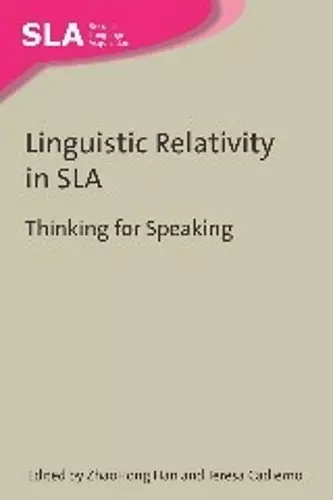Linguistic Relativity in SLA
Thinking for Speaking
ZhaoHong Han editor Teresa Cadierno editor
Format:Hardback
Publisher:Channel View Publications Ltd
Published:18th Jun '10
Currently unavailable, and unfortunately no date known when it will be back

Crosslinguistic influence is an established area of second language research, and as such, it has been subject to extensive scrutiny. Although the field has come a long way in understanding its general character, many issues still remain a conundrum, for example, why does transfer appear selective, and why does transfer never seem to go away for certain linguistic elements? Unlike most existing studies, which have focused on transfer at the surface form level, the present volume examines the relationship between thought and language, in particular thought as shaped by first language development and use, and its interaction with second language use. The chapters in this collection conceptually explore and empirically investigate the relevance of Slobin’s Thinking-for-Speaking Hypothesis to adult second language acquisition, offering compelling and enlightening evidence of the fundamental nature of crosslinguistic influence in adult second language acquisition.
This is a landmark publication - the first to concertedly address the implications for SLA of Slobin's thinking-for-speaking hypothesis. Do processes of conceptualisation that L1s predispose speakers to affect their L2 production, and if so in what ways? Can we 're-think' for L2 speaking, and what cognitive abilities enable this? The research issues this book raises are fundamentally important for SLA theory and pedagogy alike.
-- Peter Robinson, Professor of Linguistics and SLA, Aoyama Gakuin University, Tokyo, Japan.Language affects how we think. Slobin’s (1996) ‘thinking-for-speaking’ hypothesis concerns the ways that native language directs speakers’ attention to pick those characteristics of events that are readily encodable therein. In this impressive collection, Han and Cadierno marshal strong support for effects of native language upon second language use, i.e. for ‘rethinking-for-speaking’. A must-read for anybody interested in linguistic relativity and transfer in SLA.
-- Nick Ellis, University of Michigan, USA.The volume provides valuable insight into the challenges for the TfS model and SLA research. Rather than seeing the disparities in outcomes as a negative, they should be seen as a call for more research in the area.
-- Anne Marie Devlin, Department of French, University College Cork * Linguist List 22.649 *This collection is unique in that there are no dull moments: all the articles stand out as excellent contributions to a rapidly growing field of interest. Moreover, the contributions are remarkably consistent in that they all follow, or at least significantly refer to, the book's subtitle: "thinking for speaking", and illustrate this general theme with carefully chosen examples from a number of different language...Han and Cadierno's book represents a very worthwhile contribution, both to the "thinking for speaking" discussion and to various other matters in the theory and practice of L2 acquisition, such as the thorny problem of "L2 fossilization" and issues surrounding "native-like" L2 competence.
-- Jacob L. Mey, University of Southern Denmark, Denmark * Pragmatics and Society 5:1 (201ISBN: 9781847692771
Dimensions: 234mm x 156mm x 18mm
Weight: 510g
232 pages